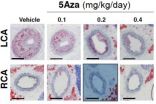(Press-News.org) A school-based scheme to encourage children to eat healthily and be active has had little effect, conclude researchers in a study published on bmj.com today.
The findings have relevance for researchers, policy makers, public health practitioners, and doctors, and they suggest that more intense interventions may be required.
Low levels of physical activity and of fruit and vegetable consumption in childhood are associated with adverse health outcomes. School based interventions have the potential to reach the vast majority of children, and evidence reviews have suggested some beneficial effect. However, the poor quality of many of the previous trials means their effectiveness may be exaggerated.
So a team led by Professor Debbie Lawlor at the University of Bristol decided to investigate the effectiveness of a school based intervention to increase physical activity, reduce sedentary behaviour, and increase fruit and vegetable consumption in children.
The Active for Life Year 5 (AFLY5) intervention took place at 60 primary schools in the south west of England and involved over 2,000 children aged 8-10 years over the study period. The trial was funded by the National Institute for Health Research Public Health Research programme.
The study was designed to overcome many of the limitations of previous trials in this area. For example, the study included a large number of children and used accelerometers to measure activity levels.
The intervention consisted of teacher training, lesson plans and interactive homework activities, and written material for school newsletters and parents. Schools were randomly allocated to either the intervention or control arm (control schools received standard teaching).
The researchers found no evidence that the intervention increased time spent in moderate or vigorous physical activity or reduced time spent in sedentary behaviour when both were assessed using accelerometers. There was also no effect on child reported fruit and vegetable consumption.
Further analysis found, however, that the intervention was effective in reducing child reported time spent in front of a screen at weekends and self reported consumption of snacks and high energy drinks.
Despite being one of the largest trials in this area to date, and taking account of limitations of previous trials, the authors conclude that the AFLY5 intervention "is not effective at increasing levels of physical activity, decreasing sedentary behaviour, and increasing fruit and vegetable consumption in primary school children."
They suggest that a change in these activities "may require more intensive behavioural interventions with children or upstream interventions at the family and societal level, as well as at the school environmental level." Professor Lawlor adds "it is possible that the increased child-efficacy and knowledge that the intervention aims to affect takes some time to embed and affect behaviour. Further follow-up of these children will test that."
INFORMATION:
Research: Effect of intervention aimed at increasing physical activity, reducing sedentary behaviour, and increasing fruit and vegetable consumption in children: Active for Life Year 5 (AFLY5) school based cluster randomised controlled trial
School scheme unable to boost healthy eating and activity among kids
More intensive programs may be needed to bring about change, say researchers
2014-05-28
ELSE PRESS RELEASES FROM THIS DATE:
Barriers to HIV testing in older children
2014-05-28
Concerns about guardianship and privacy can discourage clinics from testing children for HIV, according to new research from Zimbabwe published this week in PLOS Medicine. The results of the study, by Rashida A. Ferrand of the London School of Hygiene & Tropical Medicine and colleagues, provide much-needed information on how to improve care of this vulnerable population.
More than three million children globally are living with HIV (90% in sub-Saharan Africa) and in 2011 an estimated 1000 infant infections occurred every day. HIV acquired through mother-to-child transmission ...
Making research findings freely available is an essential aid to medical progress
2014-05-28
In a PLOS Medicine guest editorial, Paul Glasziou, Professor of Evidence-Based Medicine at Bond University in Australia, explores how open access publications could help moderate and reduce the vast waste of global medical research.
Continuing on from his previous work, which highlighted how most of the world's expenditure on medical research was thrown away, Glasziou outlines how bad the situation is and suggests how it might be improved. Subscription-based academic journals make money by through copyrights assigned by authors to publishers who lock the articles behind ...
Dealing with stress -- to cope or to quit?
2014-05-28
Cold Spring Harbor, NY – We all deal with stress differently. For many of us, stress is a great motivator, spurring a renewed sense of vigor to solve life's problems. But for others, stress triggers depression. We become overwhelmed, paralyzed by hopelessness and defeat. Up to 20% of us will struggle with depression at some point in life, and researchers are actively working to understand how and why this debilitating mental disease develops.
Today, a team of researchers at Cold Spring Harbor Laboratory (CSHL) led by Associate Professor Bo Li reveals a major insight ...
Intertwined evolution of human brain and brawn
2014-05-28
The cognitive differences between humans and our closest living cousins, the chimpanzees, are staggeringly obvious. Although we share strong superficial physical similarities, we have been able to use our incredible mental abilities to construct civilisations and manipulate our environment to our will, allowing us to take over our planet and walk on the moon while the chimps grub around in a few remaining African forests.
But a new study suggests that human muscle may be just as unique. Scientists from Shanghai's CAS-MPG Partner Institute for Computational Biology, together ...
Disturbance in blood flow leads to epigenetic changes and atherosclerosis
2014-05-28
Disturbed patterns of blood flow induce lasting epigenetic changes to genes in the cells that line blood vessels, and those changes contribute to atherosclerosis, researchers have found. The findings suggest why the protective effects of good blood flow patterns, which aerobic exercise promotes, can persist over time. An epigenetic change to DNA is a chemical modification that alters whether nearby genes are likely to be turned on or off, but not the letter-by-letter sequence itself.
The results are scheduled for publication in the Journal of Clinical Investigation.
Atherosclerosis ...
Keeping active pays off even in your 70s and 80s
2014-05-28
Older people who undertake at least 25 minutes of moderate or vigorous exercise everyday need fewer prescriptions and are less likely to be admitted to hospital in an emergency, new research has revealed.
The findings, published in the journal PLOS ONE, reinforce the need for exercise programmes to help older people stay active. It could also reduce reliance on NHS services and potentially lead to cost savings.
In the first study of its kind looking at this age group, researchers from the University of Bristol looked at data from 213 people whose average age was 78.
Those ...
Endoscopic procedure does not reduce disability due to pain following gallbladder removal
2014-05-27
In certain patients with abdominal pain after gallbladder removal (cholecystectomy), undergoing an endoscopic procedure involving the bile and pancreatic ducts did not result in fewer days with disability due to pain, compared to a placebo treatment, according to a study in the May 28 issue of JAMA.
Post-cholecystectomy pain is a common clinical problem. More than 700,000 patients undergo cholecystectomy each year in the United States, and at least 10 percent are reported to have pain afterwards. Most of these patients have no significant abnormalities on imaging or ...
Study examines variation in cardiology practice guidelines over time
2014-05-27
An analysis of more than 600 class I (procedure/treatment should be performed/administered) American College of Cardiology/American Heart Association guideline recommendations published or revised since 1998 finds that about 80 percent were retained at the time of the next guideline revision, and that recommendations not supported by multiple randomized studies were more likely to be downgraded, reversed, or omitted, according to a study in the May 28 issue of JAMA.
As adherence to recommended clinical practice guidelines increasingly is used to measure performance, ...
Penn study: Longest-lasting cardiology guidelines built on findings of randomized controlled trials
2014-05-27
PHILADELPHIA –Clinical practice guideline recommendations related to screening and treatment can change markedly over time as new evidence about best practices and clinical outcomes of various treatments emerges. In a first-of-its-kind study, Penn Medicine researchers examined high-level recommendations published by the American College of Cardiology (ACC) and the American Heart Association (AHA) between 1998 and 2007 and found that recommendations which were supported by multiple randomized controlled trials were the most "durable" and least likely to change over time. ...
Citizens help researchers to challenge scientific theory
2014-05-27
Science crowdsourcing was used to disprove a widely held theory that "supertasters" owe their special sensitivity to bitter tastes to an usually high density of taste buds on their tongue, according to a study published in the open-access journal Frontiers in Integrative Neuroscience.
Supertasters are people who can detect and are extremely sensitive to phenylthiocarbamide and propylthiouracil, two compounds related to the bitter molecules in certain foods such as broccoli and kale. Supertasting has been used to explain why some people don't like spicy foods or "hoppy" ...
LAST 30 PRESS RELEASES:
Invisible battery parts finally seen with pioneering technique
Tropical forests generate rainfall worth billions, study finds
A yeast enzyme helps human cells overcome mitochondrial defects
Bacteria frozen in ancient underground ice cave found to be resistant against 10 modern antibiotics
Rhododendron-derived drugs now made by bacteria
Admissions for child maltreatment decreased during first phase of COVID-19 pandemic, but ICU admissions increased later
Power in motion: transforming energy harvesting with gyroscopes
Ketamine high NOT related to treatment success for people with alcohol problems, study finds
1 in 6 Medicare beneficiaries depend on telehealth for key medical care
Maps can encourage home radon testing in the right settings
Exploring the link between hearing loss and cognitive decline
Machine learning tool can predict serious transplant complications months earlier
Prevalence of over-the-counter and prescription medication use in the US
US child mental health care need, unmet needs, and difficulty accessing services
Incidental rotator cuff abnormalities on magnetic resonance imaging
Sensing local fibers in pancreatic tumors, cancer cells ‘choose’ to either grow or tolerate treatment
Barriers to mental health care leave many children behind, new data cautions
Cancer and inflammation: immunologic interplay, translational advances, and clinical strategies
Bioactive polyphenolic compounds and in vitro anti-degenerative property-based pharmacological propensities of some promising germplasms of Amaranthus hypochondriacus L.
AI-powered companionship: PolyU interfaculty scholar harnesses music and empathetic speech in robots to combat loneliness
Antarctica sits above Earth’s strongest “gravity hole.” Now we know how it got that way
Haircare products made with botanicals protects strands, adds shine
Enhanced pulmonary nodule detection and classification using artificial intelligence on LIDC-IDRI data
Using NBA, study finds that pay differences among top performers can erode cooperation
Korea University, Stanford University, and IESGA launch Water Sustainability Index to combat ESG greenwashing
Molecular glue discovery: large scale instead of lucky strike
Insulin resistance predictor highlights cancer connection
Explaining next-generation solar cells
Slippery ions create a smoother path to blue energy
Magnetic resonance imaging opens the door to better treatments for underdiagnosed atypical Parkinsonisms
[Press-News.org] School scheme unable to boost healthy eating and activity among kidsMore intensive programs may be needed to bring about change, say researchers



